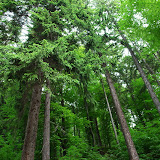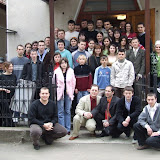Friday, April 27, 2007
indreapta-mi spre Tine inima
Tuesday, April 24, 2007
intalnire tineri / young people meeting - sighet, 20 aprilie, 2007
 Pace tuturor!
Pace tuturor!Vineri, 21 aprilie, noi, tinerii din Sighet, ne-am întâlnit în număr de trei persoane.
Text trimis de Cami Grigor
……………………………….
Peace to all!
Sometimes we are so busy for „big” and „important” things from our lives that we forget to smile or to say some nice words.
On Friday, we did not have a study but a testimony meeting and then we sang. Analyzing our own experiences, we see how God makes miracles with us and often we forget to thank Him for His enormous care. Then we tried to learn the new hymns by listening them from the blog and from different rehearsals. For this we thank to the brethren from Baia Mare.
We also thank God for this peaceful time!
Text sent by Cami Grigor
Monday, April 23, 2007
intalnire tineri - baia mare, 21 aprilie, 2007
 Sambata aceasta, ne-am intalnit ca de obicei seara, undeva pe la ora sase. Am inceput prin a discuta faptul ca este potrivit a ne ocupa timpul invatand cantari noi, dar, de asemenea, este important sa nu pierdem din vedere sensul textului unei cantari. Cu alte cuvinte, sa nu tinem cont doar de melodie si sa neglijam mesajul transmis.
Sambata aceasta, ne-am intalnit ca de obicei seara, undeva pe la ora sase. Am inceput prin a discuta faptul ca este potrivit a ne ocupa timpul invatand cantari noi, dar, de asemenea, este important sa nu pierdem din vedere sensul textului unei cantari. Cu alte cuvinte, sa nu tinem cont doar de melodie si sa neglijam mesajul transmis.
 Am terminat partea de studiu cu un fel de trivia, destinat a ne face sa retinem anumite relatii din acest capitol. Printre intrebarile lansate au fost: cine a fost sotia lui Avraam (Sarai), cine este Lot (nepotul lui Avraam), cine a fost tatal lui Avraam (Terah). Am terminat printr-o cantare, prima parte, si apoi am continuat prin citirea unei mici istorisiri despre cum a fost compusa cantarea “Maretul Har”. Apoi am pregatit cantarile pentru duminica dimineata, care au fost pana la urma in numar de trei.
Am terminat partea de studiu cu un fel de trivia, destinat a ne face sa retinem anumite relatii din acest capitol. Printre intrebarile lansate au fost: cine a fost sotia lui Avraam (Sarai), cine este Lot (nepotul lui Avraam), cine a fost tatal lui Avraam (Terah). Am terminat printr-o cantare, prima parte, si apoi am continuat prin citirea unei mici istorisiri despre cum a fost compusa cantarea “Maretul Har”. Apoi am pregatit cantarile pentru duminica dimineata, care au fost pana la urma in numar de trei.Text semnat de Daniel Achim
Saturday, April 21, 2007
convenţia generală a studenţilor bibliei, baia mare, 14 aprilie

Câteva poze de la Convenţia Generală a Studenţilor Bibliei din România, ce a avut loc la Baia Mare, în 14 aprilie, anul acesta. Pentru vizualizare - click pe titlul articolului sau aici. Pozele au fost postate la o rezoluţie scăzută, dar pentru cei care doresc în mod special anumite fotografii, îi rugăm să lase un mesaj la "comments", împreună cu adresa de mail, şi vor primi pozele cerute la rezoluţia iniţială. Mulţumim Domnului pentru binecuvântarea acestor două zile.
Friday, April 13, 2007
Mereu mi-aduc aminte
Wednesday, April 11, 2007
the youth meeting - Baia Mare, the 7th of April, 2007
The young Bible Students from Baia Mare gathered again at the meeting hall, having the ardent desire to learn the Truth. Even if we were just 13, I’m convinced there are more young ones to be considered that way.
The time we spent together had two parts. During the first one, we studied the parable of “The wine growers”, from Mathew,
Most of the questions sounded like this – “what does it represent?”.
The householder – the God of Israel
The winepress – the sweet juice the vine should have produced under those conditions (the Law, Lord’s word and the name of God’s people)
The tower – the guardians who announced when the vineyard was in danger – God’s prophets
The renters – those who were responsible for the growing of the vineyard, the gathering of the crops (for the time the householder would ask for his share) – the religious leaders,
When the time of the crops came, “The Great Householder” sent his servants (the prophets) for his share, but he did not get anything; his servants were beaten and even killed. The parable does not mention the renters wanted to hide the crops (and lead by Isaiah 5:4), we understood the vineyard didn’t get the expected fruit. This is why the servants were so badly received.
The householder didn’t get discouraged and sent his son to get the fruit, expecting he would be better received. But it wasn’t this way. His son became a greater threatening for the renters (“this is the heir”, they said) and they got him out of the vineyard and killed him.
We got “the wages of the renters” and “the future of the vineyard” from the 41st verse and Isaiah 5:5-6. The renters were meant to be lost and the vineyard would be offered to other renters (beginning with the apostles) who would bring the right fruit. In the 42nd verse, we had our confirmation in that prophecy: “the stone that builders rejected is now the cornerstone”. We could find these wonderful prophecies and promises in Psalm 118:22 and Isaiah 28:26.
In the end, we talked about this cornerstone, which became a stumbling stone for those who fall upon it (verse 44, for natural
The second part, the juiciest one, was a time of joy, when we all praised God by our hymns.
We thank our Heavenly Father for revealing these precious teachings to us.
May Lord be blessed for He led our meeting!
A text sent by Daniel Pode
Tuesday, April 10, 2007
intalnire tineri - baia mare, 7 aprilie, 2007

Tinerii din Baia Mare, cu dorinţă arzătoare de a învăţa Adevărul şi de a lăuda pe Domnul, ne-am strâns la casa de adunare. Chiar dacă am fost în număr de 13, sunt încredinţat că sunt mai mulţi tineri care se încadrează în categoria mai sus amintită.
Timpul petrecut împreună a fost împărţit în două, în prima parte am studiat „Pilda vierilor” din Matei 21:33-45, iar în a doua parte am învăţat şi repetat cântări spre lauda lui Dumnezeu, acestea fiind „deschise şi închise” de câte o rugăciune de mulţumire. Programul a fost foarte animat chiar dacă nu toţi cei prezenţi se încadrau (la ani), în categoria tânără, dar mulţumim Domnului pentru fraţii Nelu şi Magda Hosu (prezenţi cu noi), a căror râvnă o depăşeşte de multe ori pe cea a tinerilor.
După cum cred că vă imaginaţi, pilda vierilor a stârnit multe semne de întrebare, iar eu voi încerca să conturez răspunsurile care s-au primit la aceste întrebări.
Chiar de la primul verset, întrebările aveau cam aceeaşi structură – „ce reprezintă?”
Gospodarul – Dumnezeul lui Israel
Via – casa lui Israel (am fost ajutaţi de Isaia 5:7)
Gardul – Legea, Legământul Legii făcut de Dumnezeu cu poporul Israel
Teascul – mustul gustos şi dulce, pe care „via” ar fi trebuit să-l aducă având toate condiţiile pentru aceasta (Legea, Cuvântul lui Dumnezeu şi numele de Popor al lui Dumnezeu)
Turnul – străjerii care dădeau semnal când „via era în pericol” – profeţii lui Dumnezeu
Vierii – responsabilii cu creşterea „viei”, rodul ei, strânsul recoltei, (pentru atunci când Gospodarul va cere partea lui) – conducătorii religioşi, preoţii lui Israel

Când s-a făcut vremea roadelor, „Marele Gospodar” a trimis robii (profeţii) după partea lui de rod, dar n-a primit nimic, robii fiind bătuţi şi chiar omorâţi. Deoarece nu este amintit nimic de faptul că vierii ar fi vrut să ascundă rodul, şi ajutaţi de prorocul Isaia din 5:4, am înţeles că via nu dăduse rodul aşteptat, de aceea primirea robilor a fost într-o manieră atât de ostilă.
Gospodarul nu s-a descurajat, şi-a trimis chiar fiul după rod, aşteptând ca acesta să fie primit bine, dar n-a fost aşa, fiul prezentând o mai mare ameninţare pentru vieri, „iată moştenitorul”, acesta a fost prins, scos afară din vie şi omorât.
„Răsplata primită de vieri” şi „viitorul viei” le-am extras din versetul 41 şi Isaia 5:5-6. Pe vieri îi va pierde, iar via o va da altor vieri (începând cu apostolii) care vor aduce roadele cuvenite. Iar în versetul 42, am citit confirmarea celor de mai sus prin profeţia: „Piatra, pe care au lepădat-o zidarii, a ajuns să fie pusă în capul unghiului”. Despre aceste minunate profeţii şi promisiuni am mai citit în Psalmul 118:22 şi Isaia 28:16.
Finalul discuţiilor a fost dominat de această piatră din capul unghiului, care pentru unii este poticnire (vers 44), pentru acei ce cad peste ea, adică pentru Israel ca popor şi chiar Israelul spiritual nominal, care mai au posibilitatea să se ridice. Iar pentru unii este nimicire/spulberare, pentru clasa pretinsă a lui Israel (cărturari şi farisei) şi transpus în cei care cunosc voia Stăpânului dar nu o fac.
Mulţumim Tatălui ceresc pentru aceste valori descoperite nouă.
Am trecut la a doua parte a programului, în care am gustat frişca tortului cu care am fost serviţi în acea după masă, şi anume am cântat, lăudând pe Dumnezeu.
Fie binecuvântat Dumnezeu, care a fost centrul întâlnirii noastre!
Text semnat de Daniel Pode
Friday, April 6, 2007
youth meeting - cluj, the 31 of march, 2007
signed by sorin
Thursday, April 5, 2007
intalnire tineri - cluj, 31 martie, 2007

sambata, ne-am adunat la mine acasa. n-am fost multi. doar 5 dintre noi au venit: paul, ioana, diana, mihai si eu. insa a fost ok. la inceput si la sfarsit am cantat cantari, paul si ioana prezentandu-se onorabil la chitara. dat fiind faptul ca am fost in preajma cinei de amintire, ne-am gandit sa discutam despre ultimele zile ale Domnului Isus pe pamant. in principal ne-am concentrat pe a stabili timpul intamplarilor; am incercat sa vedem in ce zile, unde si cand sunt plasate ultimele evenimente din viata lui Isus. Astfel, am aflat ca in ziua a 8-a incepea sabatul iudeu; in ziua a 9-a Isus ia cina in casa lui Simon leprosul, unde Maria sparge vasul de alabastru si ii toarna mir pe cap. tot atunci, am aflat ca Iuda face o intelegere cu preotii, iar spre sfarsitul zilei, Domnul se duce pe Muntele Maslinilor si isi trimite ucenicii la Betfaghe, dupa un magarus. la inceputul zilei a 10-a are loc intrarea triumfala in Ierusalim, cand poporul il primeste cu bucurie, acelasi popor care peste doar 3 zile va striga sa fie rastignit. tot in aceasta zi, are loc intamplarea cu smochinul, cand Isus blestema un smochin infrunzit, insa fara roade. ca "primul act regesc" ne este prezentat scoaterea vanzatorilor din templu, cand Isus acuza norodul ca au facut dintr-un loc sfant o pestera de talhari. peste noapte, se retrage pe Muntele Maslinilor, dupa cum este scris ca ziua invata in templu, iar noaptea o petrecea pe munte. in ziua a 11-a, Isus pronunta sentinta impotriva natiunii lui
Monday, April 2, 2007
the youth meeting - Baia Mare, the 31st of March, 2007

Peace to all of you! On the Saturday evening, God blessed the young Bible Students from Baia Mare, to gather again, at the meeting hall, in a pretty large number (17). The main subject of the study was the text from the 10th and 11th chapters of Genesis. Due to the fact the "Passover" was drawing near, we decided to discuss about this subject, too. A hymn opened the program, the br. Sergiu's prayer followed. The study, prepared and led by br. Alin, started with the 10th chapter. It contains the descending generations of Noah, Japheth, Ham and Shem.
The first question raised from the verse 8 – "Who was Nimrod?". First of all, the answers came from the translation of this name, which means "rebellion". Then, br. Cipri suggested us to read the booklet called "The Mythology and the Bible", where we can get some facts about this Nimrod. Apparently, Nimrod was " a mighty hunter before the Lord", but he used to be a rebel, a ruler over
A second question followed, from verse 2: if there is any connection between Magog and Revelation 20:8 – "and will come out to deceive the nations that are at the four corners of the earth, Gog and Magog, to gather them for battle". The meaning of these two names (which, apparently, represent the same thing, the Antichrist) indicates they point to a certain nation (the Strong dictionary – a barbarous northern region – Magog).
Then, the 11th chapter followed. We talked about the main ideas from here: rebellion against God, making themselves a name, unity (without having God as their ruler), building for keeping themselves together, despite the fact God ordered them to "be fruitful, multiply and fill the earth" (Genesis, 1:28). It is the same story today. The idea of unity, of gathering power, of ruling, makes us think of the modern trends for a global unity over the whole Earth (UN, EU etc). But none of these ideas has God as a ruler. Our conclusion was that these works belong to the evil one, to the adversary.
Then, we talked about the 5th verse ("and the Lord came down"). As we previously learned, God uses different methods to have His work done (by angels, seraphims, archangels). His presence at the
The second part of our program was about the "Passover". Br. Daniel Pode suggested we should study John, chapter 17, that, as we all know, presents our Lord's prayer before He got arrested. The question appeared from the 9th verse – "I am praying for them. I am not praying for the world but for those whom you have given me" – why didn't He prayed for the world? The answer was that, as for the beginning, during The Gospel Age, our Lord is choosing a church, a bride, a special class. First of all, He is working for this purpose. Then, from the 16th verse: "they are not from the world". Why did He say the disciples were not from the world? We answered that all those begotten by the Spirit are begotten to a new nature – a divine one. (2 Pet. 1:4 – "by which He has granted to us His precious and very great promises, so that through them you may become partakers of the divine nature")
This chapter is so rich in its meanings and it was getting late, we decided to stop our study here, in order to prepare the hymns for the next day, as they would be presented during our Sunday program. We also set up who was going to help us with leading the next meeting and what subject we would talk.
We end the program with a half an hour of songs, which, I hope, br. Cipri will post on the blog!
We thank the Lord for all His blessings and for our fellowship!
Text sent by Calin Morar
intalnire tineri - baia mare, 31 martie, 2007
 Pace tuturor! Sambata seara, cu ajutorul D-lui, tinerii din Baia Mare s-au adunat din nou, in casa de adunare, intr-un numar destul de mare (17). Subiectul pentru studiu l-au constituit capitole 10 si 11 din Geneza. Avand in vedere ca data "Cinei de amintere" era foarte aproape, s-a propus sa discutam si despre acest subiect. S-a inceput cu o cantare, apoi ne-am unit toti intr-o rugaciune rostita de fr. Sergiu. Studiul a fost condus si pregatit de catre fr. Alin.
Pace tuturor! Sambata seara, cu ajutorul D-lui, tinerii din Baia Mare s-au adunat din nou, in casa de adunare, intr-un numar destul de mare (17). Subiectul pentru studiu l-au constituit capitole 10 si 11 din Geneza. Avand in vedere ca data "Cinei de amintere" era foarte aproape, s-a propus sa discutam si despre acest subiect. S-a inceput cu o cantare, apoi ne-am unit toti intr-o rugaciune rostita de fr. Sergiu. Studiul a fost condus si pregatit de catre fr. Alin.
S-a trecut la studiul capitolului 11. S-a discutat de ideea ce se desprinde de aici, de razvratire impotriva lui D-zeu, aceea de a-si face un nume, de unire (fara legatura cu D-zeu), de a construi pentru a nu fi imprastiati, desi li se poruncise – "Cresteti si umpleti pamantul" (Genesa 1:28), de a fi cineva. La fel se intimpla si in zilele noastre. Ideea de unire de a avea putere, de a conduce, ne duce cu gandul la tendintele actuale ce se indreapta spre o globalizare si o unitate la nivel planetar (ONU, UE etc). Insa niciuna nu il are ca si conducator pe D-zeu. Concluzia este ca aceste lucrari sunt ale celui rau, ale impotrivitorului.

S-a trecut la al doilea punct din program – "Cina de amintire". Fr. Daniel Pode a propus sa studiem putin din Ioan cap. 17, care, dupa cum stim cu totii, relateaza rugaciunea Domnului nostru Isus inainte de a fi prins. S-a pus intrebarea din vers. 9 – "Nu ma rog pentru lume, ci pentru aceia pe care mi i-ai trimis Tu" – de ce nu s-a rugat si pentru lume? Raspunsul a fost ca pentru inceput, in Epoca Evanghelica, Domnul nostru isi alege o biserica, o mireasa, o clasa speciala. La aceasta a lucrat, in primul rand. Apoi, din versetul 16 – "ei nu sunt din lume". S-a intrebat de ucenicii nu erau din lume. S-a raspuns ca toti cei conceputi de Spirit sunt conceputi spre o alta natura – cea divina. (2 Petru 1:4 – "…prin care El ne-a dat fagaduintele Lui nespus de mari si scumpe, ca prin ele sa va faceti partasi ai firii dumnezeiesti".

Am incheiat cu o jumatate de ora de cantari, pe care sper sa le posteze fr. Cipri pe blog! Multumim Domnului pentru toate binecuvantarile Lui si pentru partasia avuta!






